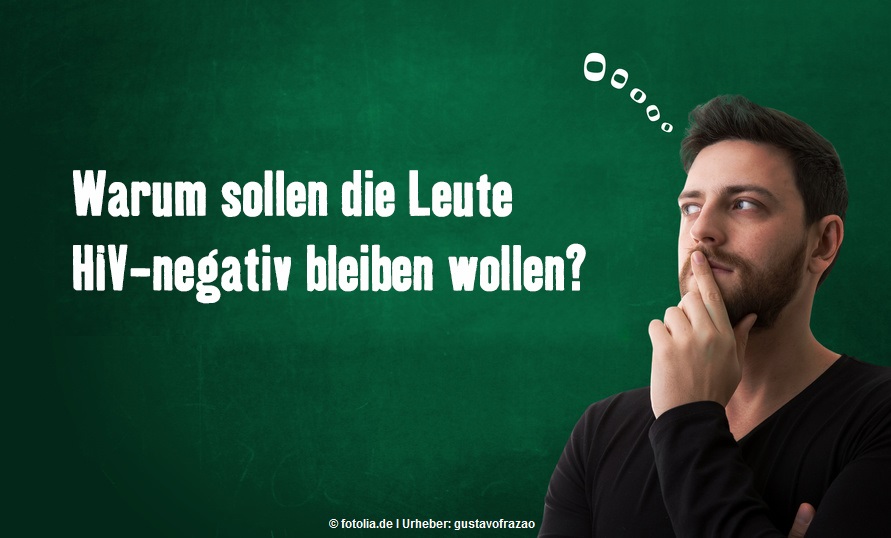In HIV prevention, there are too many calls - "Use condoms" - without justification, says Ian Howley, head of the British health organisation GMFA. His message: We will only defeat HIV if we value ourselves and our lives*.
I was born in 1984. I know, I know, if you're older you've probably already rolled your eyes so much that you would have won gold in the Eye Roll Olympics with your left hand. But please read on anyway. So: I was born in 1984, and of course I don't remember much about that decade. It wasn't until the mid-1990s that I heard about HIV and Aids for the first time. Back then I had no idea what it was, how you "got it" and how bad it was at the time I was born. So it's hard for me to see HIV the way many older gay men do. I remember at one point I asked my mum what HIV and Aids was and she said, "Oh, it's something that happens in other countries, you don't have to worry about it." In fairness to her, I grew up in a pretty small town in the middle of Ireland. I said "Okay" and went back to tending to my cheese. Enough said.
"My mum said: HIV happens in other countries"
Time jump: It's 2016, and an incredible amount has changed - and not just for me, who is now at the head of a large men's health organisation. We have come a long way in terms of HIV prevention: the days when adverts with gravestones warned of HIV are over. Today, the majority of gay and bisexual men with HIV in the UK have the infection under control - 95 per cent of patients on treatment have a viral load below the detection limit. New data from the PARTNER study have shown that there were no HIV transmissions from participants in whom HIV is no longer detectable thanks to therapy. But if that is the case, why are the numbers of new HIV infections still so high?
When I started working in LGBT health, I was shown an HIV prevention campaign by another organisation and asked what I thought of it. I said: "There's no why." Astonished faces. "No why? What do you mean?" I replied: "We simply assumethat men already know why they should use condoms or get tested. We explain the people never, Why it might be worthwhile for them to remain HIV-negative." And so I opened the door to a question that has already thrown some people for a loop.
Why should people want to stay HIV-negative?
Ask yourself: Why would you want to stay HIV-negative? We are told all the time that we should avoid HIV as much as possible. But if someone does get infected, we tell them not to worry, everything will be fine, they can lead an almost normal life. So back to my question: why? If we live in a time when HIV doesn't need to have too much of an impact on overall health, as long as the infection is treated, why do we go to such great lengths to protect men from HIV infection? I feel like we live in a bubble and just tell men to "use condoms", "get tested" or even "take PrEP". Lots of messages, but no rationale. The assumption that men already know why they should stay HIV-negative is part of the problem.
HIV prevention is also about self-esteem
HIV prevention is about much more than just telling someone to use condoms, get tested or use the PrEP should take. It's also about self-respect, self-esteem, mental health and empowerment. If you are not important to yourself, why should it be important to you to remain HIV-negative? And this is exactly where HIV prevention needs to change. We need to take a step back and think about how we want to approach this. Of course we can shout PrEP at the front and PrEP at the back and maybe even convince you that it's for you. But will you take it as prescribed if you don't care about yourself? Do you still care about the rubber when you've already had six beers and two vodkas and a shitty day at work? Life as a gay man is so much more than HIV. Sometimes we forget that.
We need a new tactic
How many men wake up in the morning thinking about HIV and other sexually transmitted infections? How many think about the possible consequences of skipping the rubber when they are horny? How many think: "Yes, it could happen to me too."? Most of us are thinking about work, the bills that need to be paid, dates or a horny number at the weekend, and many have a partner who may be dependent on them or have just split up. Life is always presenting us with new challenges and we need to finally realise that gay men's health is not just about HIV.
The "game" has changed and we need new tactics. If we want to win the fight against HIV, we won't be able to do it with PrEP or condoms or HIV testing alone. But only if we as a community value ourselves and our lives and recognise our self-worth. We will only end HIV if we work on our self-esteem and ensure that we deal with the challenges of our everyday lives. Staying HIV-negative is only one aspect of our endeavour to stay healthy. Former GMFA chief executive Matthew Hodson once put it this way in this magazine "Until we have health equity, we are not equal." And he's right.
* The original "Why we need to rethink HIV prevention" appeared as an editorial in issue 155 of FS Magazine. We would like to thank the author and GMFA for their permission to translate and publish it!










